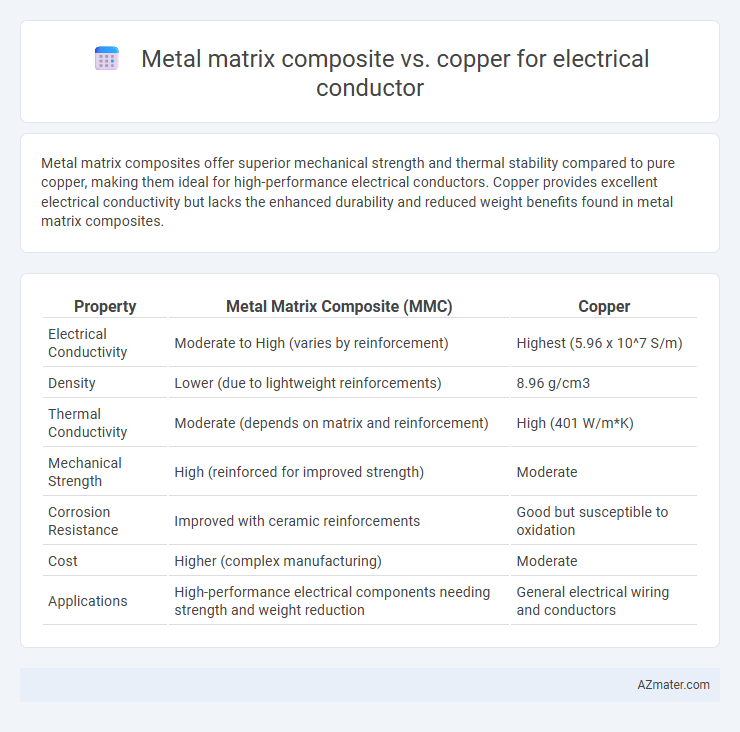Metal matrix composites offer superior mechanical strength and thermal stability compared to pure copper, making them ideal for high-performance electrical conductors. Copper provides excellent electrical conductivity but lacks the enhanced durability and reduced weight benefits found in metal matrix composites.
Table of Comparison
| Property | Metal Matrix Composite (MMC) | Copper |
|---|---|---|
| Electrical Conductivity | Moderate to High (varies by reinforcement) | Highest (5.96 x 10^7 S/m) |
| Density | Lower (due to lightweight reinforcements) | 8.96 g/cm3 |
| Thermal Conductivity | Moderate (depends on matrix and reinforcement) | High (401 W/m*K) |
| Mechanical Strength | High (reinforced for improved strength) | Moderate |
| Corrosion Resistance | Improved with ceramic reinforcements | Good but susceptible to oxidation |
| Cost | Higher (complex manufacturing) | Moderate |
| Applications | High-performance electrical components needing strength and weight reduction | General electrical wiring and conductors |
Introduction to Electrical Conductors
Metal matrix composites (MMCs) offer enhanced mechanical strength and thermal stability compared to pure copper, making them a promising alternative for electrical conductors in demanding applications. Copper remains the industry standard due to its exceptional electrical conductivity of approximately 5.8 x 10^7 S/m and excellent ductility. The choice between MMCs and copper hinges on balancing electrical performance with weight, thermal management, and durability requirements in advanced electrical systems.
Overview of Metal Matrix Composites (MMCs)
Metal Matrix Composites (MMCs) combine a metal matrix with reinforcing materials such as ceramics or fibers, offering enhanced mechanical strength, thermal stability, and wear resistance compared to pure metals like copper. MMCs tailored for electrical conductors feature improved durability and lower weight, making them suitable for high-performance applications where copper's softness and density limit performance. The ability to engineer MMCs for specific electrical and thermal conductivity requirements provides a versatile alternative to copper, particularly in aerospace, automotive, and electronics industries.
Properties of Copper as an Electrical Conductor
Copper exhibits exceptional electrical conductivity with a resistivity of approximately 1.68 uO*cm, making it one of the most efficient materials for electrical conduction. Its excellent thermal conductivity of around 400 W/mK facilitates heat dissipation in electrical applications, while its high ductility and corrosion resistance ensure durability and reliability in various environmental conditions. These intrinsic properties position copper as a benchmark material in electrical wiring, connectors, and circuit components compared to metal matrix composites.
Electrical Conductivity: MMCs vs Copper
Metal matrix composites (MMCs) typically exhibit lower electrical conductivity compared to pure copper due to the presence of ceramic or non-metallic reinforcements that scatter electrons and increase resistivity. Copper remains the benchmark for electrical conductors with a conductivity of approximately 5.96 x 10^7 S/m, significantly outperforming most MMCs. Despite their reduced conductivity, MMCs offer advantages in mechanical strength and thermal stability, making them suitable for specific applications where pure copper's softness limits performance.
Mechanical Strength Comparison
Metal matrix composites (MMCs) exhibit significantly higher mechanical strength compared to pure copper, making them more suitable for applications requiring enhanced durability and wear resistance. Copper offers excellent electrical conductivity but lacks the tensile strength and hardness found in MMCs reinforced with ceramics like silicon carbide or aluminum oxide. The improved mechanical properties of MMCs result in better performance under mechanical stress, improving conductor lifespan and reliability in harsh operating conditions.
Thermal Management Capabilities
Metal matrix composites (MMCs) offer superior thermal management capabilities compared to pure copper due to their tailored thermal conductivity and reduced weight, enabling efficient heat dissipation in electrical conductors. Copper exhibits excellent electrical conductivity but suffers from relatively higher density and limited mechanical strength, which can constrain thermal performance under high-stress conditions. MMCs such as aluminum or copper reinforced with ceramic fibers enhance heat resistance and thermal stability, making them preferable in applications demanding optimal thermal control and reliability.
Corrosion Resistance and Durability
Metal matrix composites (MMCs) exhibit superior corrosion resistance compared to pure copper, due to the incorporation of corrosion-resistant ceramic or metallic reinforcements that enhance protective properties in harsh environments. This improved corrosion resistance directly contributes to greater durability, as MMCs maintain structural integrity and electrical performance over extended periods without degradation from oxidation or chemical attack. Copper, while having excellent electrical conductivity, is more susceptible to tarnishing and corrosion, which can reduce its lifespan and reliability in applications exposed to moisture or corrosive agents.
Weight and Density Considerations
Metal matrix composites (MMCs) used as electrical conductors offer significantly lower density compared to traditional copper, reducing overall weight in applications such as aerospace and automotive wiring. The density of MMCs typically ranges from 2.5 to 3.5 g/cm3, whereas copper has a density of approximately 8.96 g/cm3, making MMCs nearly three times lighter. This weight advantage enables improved fuel efficiency and easier handling without compromising electrical conductivity.
Cost and Manufacturing Challenges
Metal matrix composites (MMCs) offer superior strength-to-weight ratios compared to pure copper, potentially reducing material costs despite higher initial investment in composite fabrication processes. Manufacturing challenges for MMCs include complex powder metallurgy and infiltration techniques that require precise temperature control and specialized equipment, increasing production costs relative to the well-established copper extrusion and annealing methods. Copper remains cost-effective for large-scale production with mature manufacturing infrastructure, though its lower mechanical strength limits performance in high-stress electrical applications where MMCs can provide enhanced durability and thermal stability.
Future Trends in Electrical Conductor Materials
Metal matrix composites (MMCs) are gaining traction as electrical conductors due to their enhanced mechanical strength, reduced weight, and improved thermal stability compared to traditional copper conductors. Future trends indicate the development of MMCs with optimized metal combinations and nano-reinforcements to achieve superior conductivity and corrosion resistance, enabling applications in high-performance electric vehicles and aerospace industries. Research advancements are driving the integration of MMCs with graphene and carbon nanotubes, promising significant improvements in electrical efficiency and longevity over pure copper conductors.

Infographic: Metal matrix composite vs Copper for Electrical conductor
 azmater.com
azmater.com